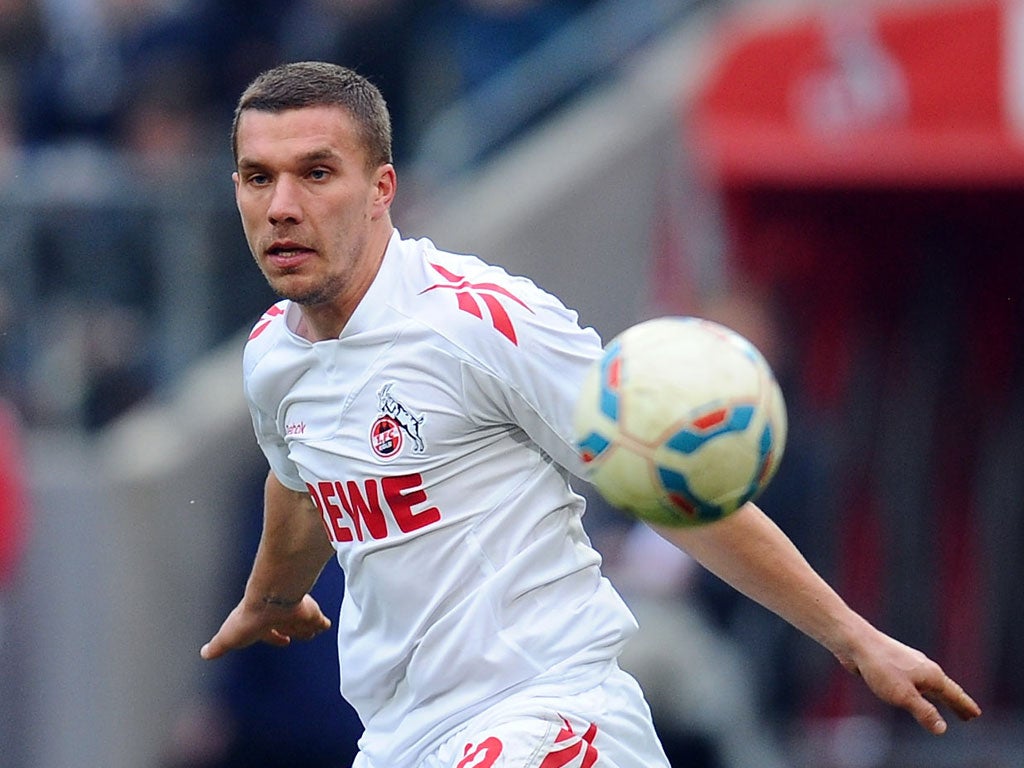Podolski move shows Wenger's change of policy
Interest in the Germany striker demonstrates how Arsenal are past gambling on players with potential

Your support helps us to tell the story
From reproductive rights to climate change to Big Tech, The Independent is on the ground when the story is developing. Whether it's investigating the financials of Elon Musk's pro-Trump PAC or producing our latest documentary, 'The A Word', which shines a light on the American women fighting for reproductive rights, we know how important it is to parse out the facts from the messaging.
At such a critical moment in US history, we need reporters on the ground. Your donation allows us to keep sending journalists to speak to both sides of the story.
The Independent is trusted by Americans across the entire political spectrum. And unlike many other quality news outlets, we choose not to lock Americans out of our reporting and analysis with paywalls. We believe quality journalism should be available to everyone, paid for by those who can afford it.
Your support makes all the difference.The likely summer arrival of Germany international striker Lukas Podolski from FC Köln marks a continuation in Arsenal's altered transfer strategy. The 26-year-old, set to sign a four-year contract in the summer in a £10.9m deal, might just represent the peak of the change from the north London club buying potentially useful players to those who can make an instant impact.
Arsenal will have bought a very serious player indeed. A man with 95 German caps, an important part of one of best international sides of recent years, with Champions League experience, a Bundesliga winners' medal, talent, confidence, strength and none of the unreliability, callowness or simple physical flimsiness which so often characterises Arsène Wenger's purchases.
The change dates back to last summer. A late-season collapse in form was followed by the departures of Cesc Fabregas and Samir Nasri, and a stripped-down Arsenal side was exposed as such in the humiliating 8-2 defeat at Manchester United in August.
Wenger admitted that his team needed more experience, if only for the benefit of his youngsters. "When you experienced what we did [at Old Trafford] and we only have players without experience to come on," he said at the time, "in a situation like that you don't even help the young players."
With Arsenal's better players concerned about the direction of the club, Wenger knew he had to assuage them. "They could be a little bit worried about our ambition," he admitted, "because they see big players moving out and not big players coming in."
And so the first wave of reinforcements arrived at the end of the transfer window: Mikel Arteta, Andre Santos and Per Mertesacker, whose inviting text messages to Podolski may have helped to convince his Germany team-mate that Arsenal would be a good stage for him.
Podolski will certainly be keen to get this move right. His career so far has been a story of promise and excellence both for Germany and for hometown club FC Köln, interrupted only by three frustrating seasons at Bayern Munich.
Born in Gliwice in Poland in 1985, four months before a player with whom he is often compared, Wayne Rooney, the Podolski family moved near Cologne when he was two, and he emerged for the club in the 2003-04 season. Like Rooney, he was a swaggering, bullish, powerful young striker, sometimes with more energy than he needed, but he always thrilled with the chance of storming past those older and less fearless than him. He made his Germany debut two days after his 19th birthday.
Unsurprisingly, the fans loved him and he loved them. Podolski emerged to a global audience in the 2006 World Cup, in which Jürgen Klinsmann's Germany reached the semi-finals. Podolski, 21, impressed with his low-slung power, scoring three goals and winning the young player of the tournament award.
A painful move from Köln to Bayern Munich followed: Podolski was part of a Bundesliga-winning side and experienced the Champions League, but in three frustrating seasons he never reached the same level of importance he did on the banks of the Rhine. So, in 2009, "Prinz Poldi" returned. His first season back was good, his second better – with 13 league goals, and in this one he has been excellent again. With 16 in the Bundesliga, only Mario Gomez and Klaas-Jan Huntelaar have scored more.
The returned confidence was best observed in the 2010 World Cup. Stationed on the left of Joachim Löw's 4-2-3-1, he burst inside from the wing, surprising England as he scored the second in the infamous 4-1 mauling in Bloemfontein. Podolski could very comfortably play the same role at Arsenal: he is more accomplished and more reliable than Gervinho.
He may, of course, be asked to play centre-forward, should Robin van Persie not be there next season, although there is increasing confidence that the captain still stay. The prospect of the pair of them combining, in an Arsenal side based on actual rather than potential usefulness, is certainly an enticing one.
Join our commenting forum
Join thought-provoking conversations, follow other Independent readers and see their replies
Comments